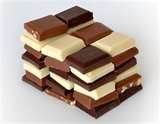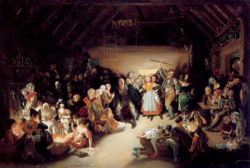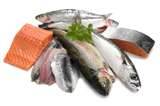Monday, October 29, 2012
Thursday, October 25, 2012
Tuesday, October 23, 2012
Halloween or Hallowe'en (a contraction of its original title "All Hallows' Evening"),[5] also known as All Hallows' Eve,[6] is a yearly holiday observed around the world on October 31, the eve of the Western Christian feast of All Hallows. Most scholars believe that All Hallows' Eve was originally influenced by western European harvest festivals and festivals of the dead with pagan roots, particularly the Celtic Samhain.[6][7][8] Others maintain that it originated independently of Samhain.[9]
Typical festive Halloween activities include trick-or-treating (also known as "guising"), attending costume parties, carving pumpkins into jack-o'-lanterns, lighting bonfires, apple bobbing, visiting haunted attractions, playing pranks, telling scary stories, and watching horror films.
Christian influences
Snap-Apple Night (1832) by Daniel Maclise.
Depicts apple bobbing and divination games at a Halloween party in Blarney, Ireland.
Depicts apple bobbing and divination games at a Halloween party in Blarney, Ireland.
Halloween is also thought to have been influenced by the Christian holy days of All Saints' Day (also known as All Hallows, Hallowmas or Hallowtide) on 1 November and All Souls' Day on 2 November.[28] They were a time for honoring the saints
and praying for the recently departed who had yet to reach Heaven. All
Saints was introduced in the year 609, but was originally celebrated on
13 May.[29] In 835, it was switched to 1 November (the same date as Samhain) at the behest of Pope Gregory IV.[29] Some have suggested this was due to Celtic influence, while others suggest it was a Germanic idea.[29]
 By the end of the 12th century they had become holy days of obligation across Europe and involved such traditions as ringing bells for the souls in purgatory and "souling", the custom of baking and sharing soul cakes for "all crysten christened souls".[30]
Groups of poor people, often children, would go door-to-door on All
Saints/All Souls collecting soul cakes, originally as a means of praying
for souls in purgatory.[31] Similar practices for the souls of the dead were found as far south as Italy.[32] Shakespeare mentions the practice in his comedy The Two Gentlemen of Verona (1593), when Speed accuses his master of "puling [whimpering or whining] like a beggar at Hallowmas."[33]
The custom of wearing costumes has been linked to All Saints/All Souls
by Prince Sorie Conteh, who wrote: "It was traditionally believed that
the souls of the departed wandered the earth until All Saints' Day, and
All Hallows' Eve provided one last chance for the dead to gain vengeance
on their enemies before moving to the next world.
In order to avoid being recognised by any soul that might be seeking
such vengeance, people would don masks or costumes to disguise their
identities".[34] In Halloween: From Pagan Ritual to Party Night, Nicholas Rogers explained Halloween jack-o'-lanterns as originally being representations of souls in purgatory.[27]
By the end of the 12th century they had become holy days of obligation across Europe and involved such traditions as ringing bells for the souls in purgatory and "souling", the custom of baking and sharing soul cakes for "all crysten christened souls".[30]
Groups of poor people, often children, would go door-to-door on All
Saints/All Souls collecting soul cakes, originally as a means of praying
for souls in purgatory.[31] Similar practices for the souls of the dead were found as far south as Italy.[32] Shakespeare mentions the practice in his comedy The Two Gentlemen of Verona (1593), when Speed accuses his master of "puling [whimpering or whining] like a beggar at Hallowmas."[33]
The custom of wearing costumes has been linked to All Saints/All Souls
by Prince Sorie Conteh, who wrote: "It was traditionally believed that
the souls of the departed wandered the earth until All Saints' Day, and
All Hallows' Eve provided one last chance for the dead to gain vengeance
on their enemies before moving to the next world.
In order to avoid being recognised by any soul that might be seeking
such vengeance, people would don masks or costumes to disguise their
identities".[34] In Halloween: From Pagan Ritual to Party Night, Nicholas Rogers explained Halloween jack-o'-lanterns as originally being representations of souls in purgatory.[27]
In Britain, these customs came under attack during the Reformation as Protestants berated purgatory as a "popish" doctrine incompatible with the notion of predestination.[28] This, coupled with the rising popularity of Guy Fawkes Night (5 November) from 1605 onward, led to Halloween's popularity waning in Britain, with the noteworthy exception of Scotland.[35] There and in Ireland, they had been celebrating Samhain and Halloween since at least the early Middle Ages,[12] and the Scottish kirk took a more pragmatic approach to Halloween, seeing it as important to the life cycle and rites of passage of communities and thus ensuring its survival in the country.[35]
Thursday, October 18, 2012
Friday, October 12, 2012
Brain Food
Brain boosting food 1: Oily fish
If you struggle to remember what day it is or what you had for
dinner an hour ago, consider stocking up on the ultimate brain food,
oily fish. Omega-3 fatty acids – found in oily fish such as salmon,
mackerel and sardines – are invaluable for just about every part of our
body, and it seems our brains are no different. Researchers from the
University of Kuopio in Finland found that eating oily fish three times a
week reduces the risk of brain problems by 26 per cent and prevents
against memory loss.
Brain boosting food 2: Dark, leafy greens
Dark, leafy greens such as spinach, kale and broccoli are packed
with antioxidants, including vitamin C and beta-carotene, which are
essential to keep your body and brain in good health. They are also a
good source of folate, which can help to speed up information processing
and memory recall. Research results published in the American Journal of Clinical Nutrition also indicated that the folate found in leafy green vegetables can help to protect against cognitive decline in old age.
Brain boosting food 3: Eggs
Egg yolks are nutritional powerhouses packed with many vitamins and
minerals essential for good brain function. This cheap and versatile
ingredient is a good source of iron, which is essential for creating red
blood cells which carry oxygen to the brain, helping to keep your
mental faculties sharp and to keep you alert and focused. Eggs are also a
good source of vitamin B12 – a deficiency of which can lead to memory
loss and confusion – and iodine, which has been shown to improve
problem-solving abilities even in only mildly deficient children.
 Brain boosting food 4: Green tea
Brain boosting food 4: Green tea
As your brain is made up of around 80 per cent water, keeping it
properly hydrated is vital for helping it to function at optimum levels.
However, if you’re not a fan of regular water, swapping it for a cup of
green tea could have added benefits for your brain. A Korean study has
found that green tea can help to increase mental alertness and enhance
your memory. Researchers have also found that the antioxidants found in
green tea can help to protect the brain and reduce risk of dementia.
Brain boosting food 5: Chocolate
 No, it’s not just wishful thinking – chocolate really is good for
you! While chomping on bars of milk chocolate is unlikely to improve
your IQ score, dark chocolate is rich in brain-boosting chemicals,
called flavonoids, which can enhance your cognitive skills. Research has
found that flavonoids induce the creation of new neurons in the brain
and also improve their ability to form new memories. Studies also show
that flavonoids improve blood flow to the brain. One study of adult
women found that when given flavonoid-rich chocolate drinks, the blood
flow to participants' brains increased within two hours and they
performed better on a complex mental task. Read more on realbuzz.com...
No, it’s not just wishful thinking – chocolate really is good for
you! While chomping on bars of milk chocolate is unlikely to improve
your IQ score, dark chocolate is rich in brain-boosting chemicals,
called flavonoids, which can enhance your cognitive skills. Research has
found that flavonoids induce the creation of new neurons in the brain
and also improve their ability to form new memories. Studies also show
that flavonoids improve blood flow to the brain. One study of adult
women found that when given flavonoid-rich chocolate drinks, the blood
flow to participants' brains increased within two hours and they
performed better on a complex mental task. Read more on realbuzz.com...
We have to keep up with our small ones :) they are learning new things everyday, we don't want to be obsolete LOL
Friday, October 5, 2012
Thursday, October 4, 2012
We are proud of you. Happy World Teachers' Day!
To
all teachers, thank you for all your sacrifice and patience. May God
reward you for the great job you are doing and give you strength to
continue.
James 3:1 "Don't be in any rush to become a teacher, my friends. Teaching is highly responsible work. Teachers are held to the strictest standards." (from THE MESSAGE: The Bible in Contemporary Language)
James 3:1 "Don't be in any rush to become a teacher, my friends. Teaching is highly responsible work. Teachers are held to the strictest standards." (from THE MESSAGE: The Bible in Contemporary Language)
Wednesday, October 3, 2012
Subscribe to:
Posts (Atom)











